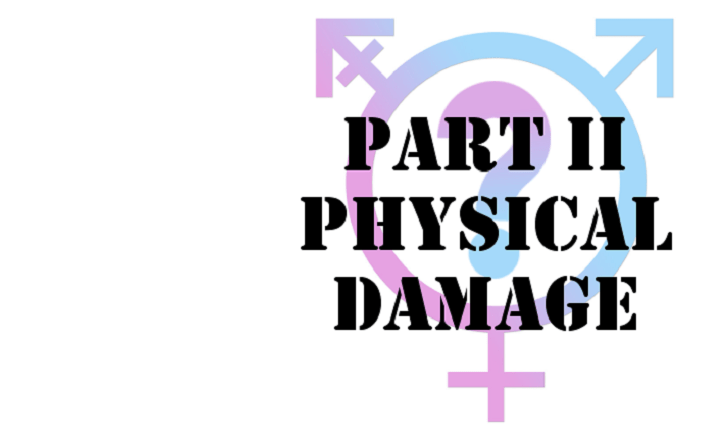This is the second of our three-part series on this subject.
- There are no medical criteria to determine if a child needs to undergo transition procedures.
- According to the Mayo Clinic “Feminizing hormone therapy” (the process of a male taking female hormones) comes with risks and complications including:
–A blood clot in a deep vein (deep vein thrombosis) or in a lung (pulmonary embolism)
–High triglycerides, a type of fat (lipid) in your blood
–Weight gain
–Infertility
–High potassium (hyperkalemia)
–High blood pressure (hypertension)
–Type 2 diabetes
–Cardiovascular disease
–Excessive prolactin in your blood (hyperprolactinemia)
–Nipple discharge
–Stroke
–Increased risk of breast cancer
- Taking female hormones can cause lasting damage in men. The risk of permanent infertility increases with long-term use of hormones, especially when hormone therapy is initiated before puberty. Even after stopping hormone therapy, testicular function might not recover sufficiently to ensure conception.
- According to the Mayo Clinic “Masculinizing hormone therapy” (the process of a female taking male hormones) comes with risks and complications including:
–Producing too many red blood cells (polycythemia)
–Weight gain
–Acne
–Developing an abnormal level of cholesterol and other lipids, which may increase cardiovascular risk (dyslipidemia)
–High blood pressure (hypertension)
–Type 2 diabetes
–Deep vein thrombosis and/or pulmonary embolism (venous thromboembolism)
–Infertility
–A condition where the lining of the vagina becomes drier and thinner (atrophic vaginitis)
–Pelvic pain
–Clitoral discomfort and vaginal atrophy
–Endometrial and other forms of cancer
- Taking male hormones can cause lasting damage in women. The risk of permanent infertility increases with long-term use of hormones, especially when hormone therapy is initiated before puberty. Even after stopping hormone therapy, ovarian and uterine function might not recover well enough to ensure that a woman can become pregnant.
- Testosterone is a Schedule III controlled substance. It has serious health risks as noted above. However, to treat gender dysphoria, it is used by some as a cosmetic procedure rather than something requiring strict medical oversight. Some gender therapists administer the drug based on what the patient is feeling. In terms of a set dose, the only goal most medical professionals have is to keep the testosterone in the normal limit for a man.
- According to the British National Health Service (NHS): “Little is known about the long-term side effects of hormone or puberty blockers in children with gender dysphoria. Although the Gender Identity Development Service (GIDS) advises this is a physically reversible treatment if stopped, it is not known what the psychological effects may be. It’s also not known whether hormone blockers affect the development of the teenage brain or children’s bones. Side effects may also include hot flushes, fatigue and mood alterations.”
- Lupron, a drug once used in chemical castrations, is a popular puberty blocker. Lupron has caused neurological damage resulting in impaired pituitary function. The pituitary is the major endocrine gland in the brain and is important in controlling growth and development and the functioning of other endocrine glands. The effect on the pituitary was not reversible for 62.5% of patients. While the FDA has approved this drug to halt precocious puberty, it is not approved to halt normal puberty nor is it approved for long-term use. Lupron is now prescribed off-label.
- Puberty blockers are not a neutral intervention. Although some gender therapists present them as a safe alternative to buy time to allow for a child to determine his or her gender identity, halting puberty is unhealthy. Side effects include suppression of normal bone density development, greater risk of osteoporosis, loss of sexual function, interference with brain development and possibly suppressing peak IQ. Additionally, these drugs alienate a child from his or her sex. Further, in some instances after a child stops taking them puberty does not resume even if they wanted it to. One clinical study found that 100% of participants who used puberty blockers ultimately underwent a full transition.
- Binders, a devise used frequently by teenage girls that constrict their breasts tight against the body to give them a more masculine appearance, can cause serious harm. Broken or bruised ribs, punctured or collapsed lungs, shortness of breath, back pain, and deformation of breast tissue can result from wearing these devices.
- In women, top surgery, or a double mastectomy, leads to a permanent loss of breast function and comes with the risks of complication associated with any surgical procedure.
- In women, bottom surgery, either phalloplasty or metoidioplasty, are extremely complex procedures that can result in complications.
–In phalloplasty, doctors take a graft and create a new appendage in the groin area. Blood clots and infections are common. Additionally, the forearms, where most of the grafts are from for this procedure, can also suffer significant damage permanently leaving an individual unable to fully use their arms. Usually, the urethra will be run through the appendage; however, this is not without its own share of hazards, most especially leaks both internally and externally.
–Metoidioplasty involves the clitoris to be shaped to look like a penis, though it has no functionality other than the urethra can be run through it allowing for urination.
For a glossary of terms, click here.









